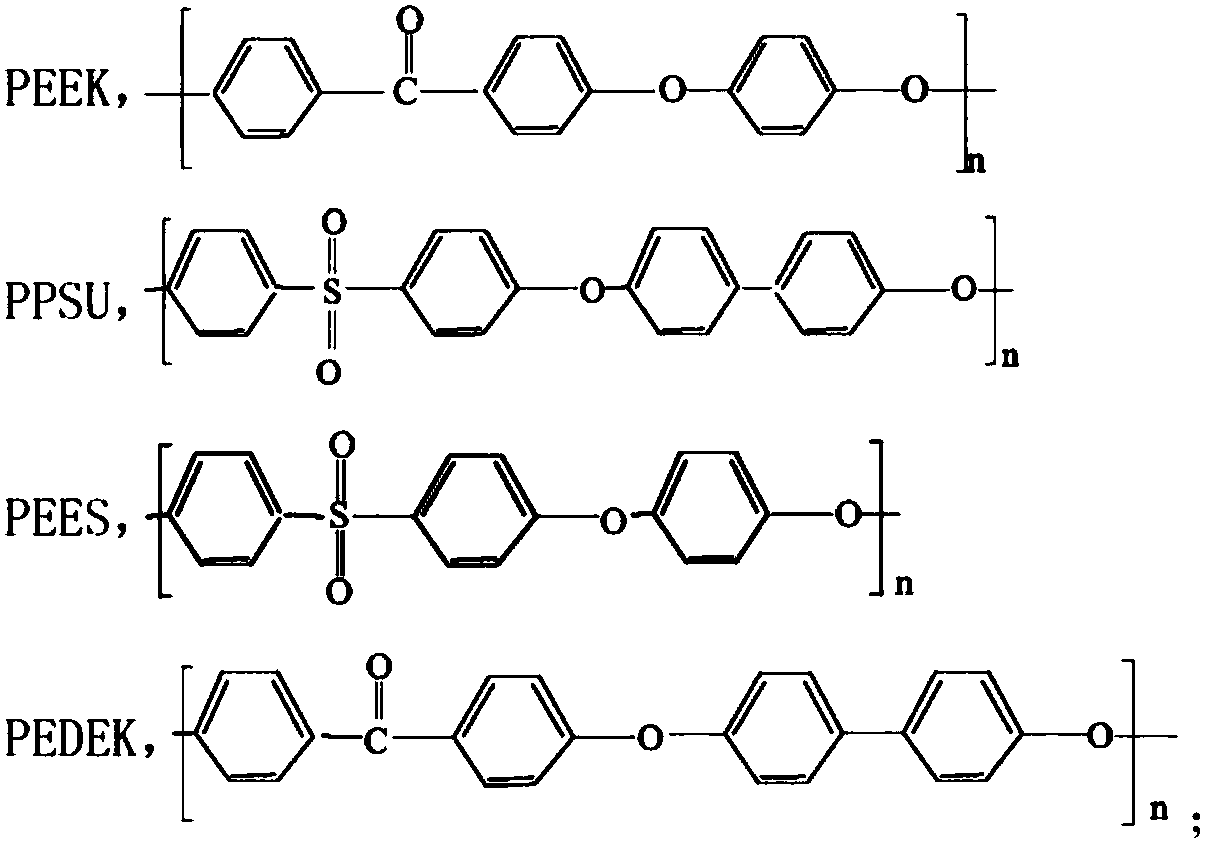A method for preparing poly(aryl ether ketone sulfone) random copolymers by quaternary polycondensation technology
A tetrapolymer and co-condensation technology, which is applied in the field of tetrapolymer random copolymers, can solve the problems of difficult control of the ternary and quaternary copolymerization reaction process, wide range of polymer molecular weight distribution, and difficulty in industrialization, etc., to achieve molecular weight distribution. Narrow range, improved thermal stability or solvent resistance, good end-capping effect
- Summary
- Abstract
- Description
- Claims
- Application Information
AI Technical Summary
Problems solved by technology
Method used
Image
Examples
Embodiment 1
[0039] In a 1-liter four-neck flask equipped with a nitrogen tube and a high-efficiency stirrer, first add 336.00 g of diphenyl sulfone, 108.000 g of 4,4'-difluorobenzophenone, 0.931 g of biphenol, and 1.438 g of 4,4 After '-dichlorodiphenylsulfone and 63.600g of sodium carbonate, start to heat up until the monomers are completely dissolved, then add 54.500g of hydroquinone to the system, continue to stir evenly, then raise the temperature to 210°C~220°C, and react 1~2 hours, raise the temperature to 240°C-270°C, react for 0.5-2 hours, then raise the temperature to 310°C-320°C to polymerize for 1-4 hours, add 0.7g 3,4'-difluorobenzophenone, and continue the reaction for 10-30 Minutes to obtain polymerized mucus; the polymerized mucus is water-cooled and pulverized into powder, then the filtered powder is added to ethanol to reflux and boiled for 1 hour, and this is repeated 10 times, and then boiled with new deionized water for 1 hour, and repeated 8 to 10 times until the water...
Embodiment 2
[0043] In a 1-liter four-necked flask equipped with a nitrogen tube and a high-efficiency stirrer, first add 336.00 g of diphenylsulfone, 1.090 g of 4,4'-difluorobenzophenone, 0.931 g of biphenol, and 142.400 g of 4,4 After '-dichlorodiphenylsulfone and 63.600g of sodium carbonate, start to heat up until the monomers are completely dissolved, then add 54.500g of hydroquinone to the system, continue to stir evenly, then raise the temperature to 210°C~220°C, and react 1~2 hours, raise the temperature to 240°C-270°C, react for 0.5-2 hours, then raise the temperature to 310°C-320°C to polymerize for 1-4 hours, add 0.7g 3,4'-difluorobenzophenone, and continue the reaction for 10-30 Minutes to obtain polymerized mucus; the polymerized mucus is water-cooled and pulverized into powder, then the filtered powder is added to ethanol and boiled for 1 hour under reflux, and this is repeated 10 times, and then boiled with new deionized water for 1 hour, and this is repeated 8 to 10 times unt...
Embodiment 3
[0047] In a 1-liter four-neck flask equipped with a nitrogen tube and a high-efficiency stirrer, first add 336.00 g of diphenyl sulfone, 108.000 g of 4,4'-difluorobenzophenone, 92.174 g of biphenol, and 1.438 g of 4,4 After '-dichlorodiphenylsulfone and 63.600g of sodium carbonate, start to heat up until the monomers are completely dissolved, then add 0.550g of hydroquinone to the system, continue to stir evenly, then raise the temperature to 210°C~220°C, and react 1~2 hours, raise the temperature to 240°C-270°C, react for 0.5-2 hours, then raise the temperature to 310°C-320°C to polymerize for 1-4 hours, add 0.7g 3,4'-difluorobenzophenone, and continue the reaction for 10-30 Minutes to obtain polymerized mucus; the polymerized mucus is water-cooled and pulverized into powder, then the filtered powder is added to ethanol and boiled for 1 hour under reflux, and this is repeated 10 times, and then boiled with new deionized water for 1 hour, and this is repeated 8 to 10 times unti...
PUM
| Property | Measurement | Unit |
|---|---|---|
| melt flow index | aaaaa | aaaaa |
| melt flow index | aaaaa | aaaaa |
Abstract
Description
Claims
Application Information
 Login to View More
Login to View More - R&D
- Intellectual Property
- Life Sciences
- Materials
- Tech Scout
- Unparalleled Data Quality
- Higher Quality Content
- 60% Fewer Hallucinations
Browse by: Latest US Patents, China's latest patents, Technical Efficacy Thesaurus, Application Domain, Technology Topic, Popular Technical Reports.
© 2025 PatSnap. All rights reserved.Legal|Privacy policy|Modern Slavery Act Transparency Statement|Sitemap|About US| Contact US: help@patsnap.com



